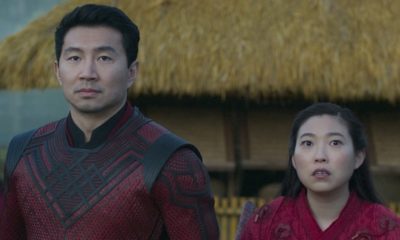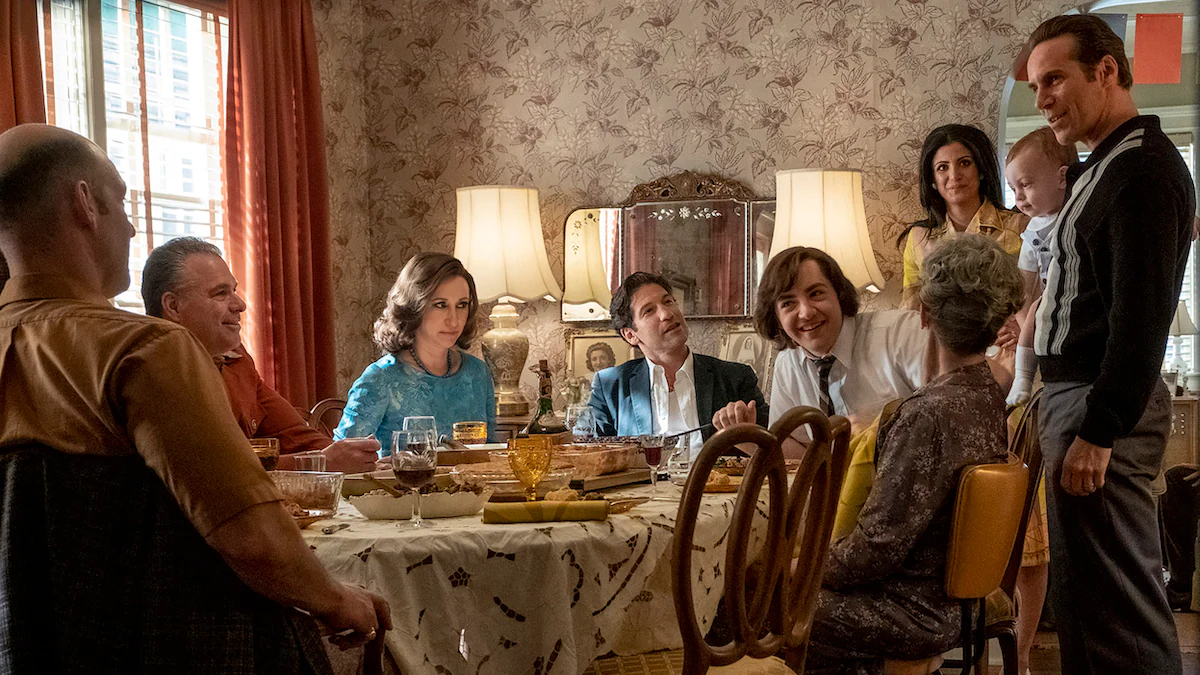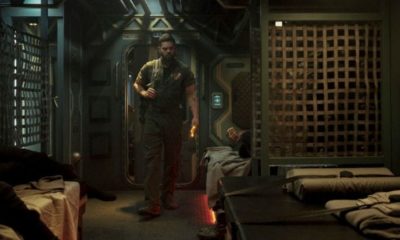“This is going to destroy you, along with everything you’ve tried to build here,” Naomi (Dominique Tipper) warns Miller (Thomas Jane) of his plan to destroy Eros at the start of “Godspeed” (Feb. 15). “The stars are better off without us,” he says by way of response.
One of science fiction’s most robust qualities its dependence on incredibly advanced technology, because its stories have not just the ability but the mandate to examine individual morality on an epic scale. No other genre bestows so much power, or responsibility, on random individuals: The CW’s “The 100” is a particularly literary investigation of this idea, its cascading apocalypses always putting some, or all, of its leads into life-or-death, black-or-white, survival-or-annihilation choices, and then watches them twist.
But even a story not specifically about that dilemma will always have at least an echo of it, because that’s what technology is, what it does: Make us more than what we are. Give us abilities, or a lifespan, or communication, that we are not born with. From eyeglasses to lasers all the way up to hollowed-out asteroids, chock-full of sentient alien parasite, science fiction is a story of augmented, still-true humanity.
RELATED: ‘The Expanse’ reaches ‘Sens8’ levels of simultaneous beauty
Fantasy comes close — but in the majority of those worlds you must have some kind of innate ability or intense training, or be the secret focus of some arcane prophecy, to use what magic is available, beyond the occasional talisman or magic wand: Not so in science fiction. With any technology sufficiently advanced as to show up in a sci-fi world, any Jane Plain (or Joe Diogo) can, by accident or design, affect — or even destroy — entire populations.
Of course there are still scientific experts and trained leaders in these worlds, but for every Walter Bishop and James T. Kirk, there are literally billions of Rose Tylers and Mickey Smiths, just regular ladies and dudes who are tripped by technology into enormous moral responsibility, and then have to live with the consequences — often in inverse proportion to the degree of practical responsibility they started with.
This episode of “The Expanse” digs into that idea, using Miller’s plan — with Fred Johnson’s (Chas L. Coleman) access to the generation ship Nauvoo — to shove the infected Eros station right into the Sun as a way of examining just how limitless random human chaos is, in this technology-driven world.
RELATED: It’s the quiet moments that make ‘The Expanse’ SyFy’s best since ‘BSG‘
Once the Rocinante and Nauvoo are in place, it’s not just the crew of the Rocinante or James Holden (Steven Strait), their reluctant captain, who find themselves making humanity-level decisions they have no training for (because there is no training for it). It’s also Miller, the rogue Belter detective who executed the lead scientist behind the alien pathogen experiment, and Diogo (Andrew Rotilio), the former illicit-water gang kid who has definitely been laid, he crush that ass to dust, no lie and has become an OPA rebel with a cause.
It’s also Victor Mesplede (Alex Woods), the captain of the humanitarian, “Doctors Without Space Borders” crew of the Erasmus, who flout the Eros quarantine order and reach (and breach) it before the Roci can stop them.
None of these individuals are responsible for the alien pathogen that has taken root on Eros, just as no single person on the Roci or in the OPA was responsible for the stealth ship that wreaked so much havoc in Season 1 — and whose origins with the Protogen Corporation Fred Johnson has passed to Chrisjen Avasarala (Shohreh Aghdashloo), so that she can commit her treason and keep everyone safe by ending the war before it starts.
As a UN official, Chrisjen has the most experience and proximity to these sorts of decisions, but that just means the stakes she gambles with are higher, the death counts and permanent loss that much starker: Like the rest, she’s found herself, by technology and by the mechanisms of governance, in a place where she has only her own instincts and moral sense to guide her as she makes choices on behalf of billions.
(Not for nothing did this episode avoid the MCRN Marine squad we’ve been following — they’re still too small yet, for a story like this week’s tale. They aren’t the ones the Roci and UN and OPA are shoving all over the place — Belters and doctors and civilians — but they are a force to be reckoned with, as the show keeps reminding us — and once Mars must commit to a plan of action, their decisions will clearly be crucial.)
Tiny humans, playing with very big toys: The actions of each individual and cell, out in the black, carry as much or more weight than any of the strategic, diplomatic and corporate moves by the power-players back Earthside: The Erasmus, hellbent on broadcasting what they found on Eros to the rest of the solar system, could erase all humanity by doing what’s right. James Holden shoots them all down, getting blood his hands from the best among us, to keep the contagion from courting enough curiosity to spread itself further.
Even Miller, as he accidentally loses the detonator for a huge bomb in the void, then takes Diogo’s place as its last trigger-finger, even as he’s saying goodbye to the ghost of Julie Mao (Florence Faivre) and the Rocinante and her crew — who’ve each grown attached to him in their different ways; the ones who hate him most of all — holds the future of humanity in his hands for a few minutes. It’s Miller who came up with the battering-ram plan, which will have unimaginable effects in days to come now that they’ve taken action against the Mormons, and Miller who ultimately takes point on the mission, diving off into space for what he knows could be the last time.
RELATED: Watch list: ‘Teen Wolf,’ ‘The Expanse’ & more
But power is nothing, in the end: These individual actors, out in the black, feel the weight of the consequences from these actions far more than the likes of government lackey Errinwright (Shawn Doyle) and unethical mogul Mao (François Chau) ever could. Holden, who was so incensed at Miller’s murder of the (very guilty and very unapologetic) mad scientist two episodes ago that he stopped talking to just about everyone, now must live with the fact that he obliterated the lives of a handful of truly good people. Out on the wings of Eros, Miller more or less chooses to die over the fact that, on top of killing the foremost scientist studying the protomolecule, he’s now stolen an entire faith’s salvation, by force.
Young Diogo accepts Miller’s sacrifice without a pause, and floats off to live his life and (finally) get laid. Mao and Errinwright volley coded threats to each other’s power, from luxuriously appointed offices back on Earth. And compared to the existential dramas playing out a billion miles away, through people whose names they barely know, the banality of their evil is so thin and silly that we can’t wait for Chrisjen to take them down, too.
While this season’s repeated motif of Alex (Cas Anvar) replaying his failures over and over is a healthy reminder of his responsibilities, more and more it seems to loom over the narrative: While moral absolutes were never practically useful in this universe, they’ve helped guide Holden et al. toward some of their greatest acts. Deprived of even that useful fiction, in navigating the days ahead, these space nobodies will have to depend more than ever on their vision of the big picture — and hope they haven’t missed anything. A terrorist act or two, a serendipitous meeting or three, a few wild calls, and suddenly they’re calling the shots for all mankind. They aren’t billionaires, they aren’t with the UN or Mars — even the OPA’s leadership and resources still seems temporary and contingent — but the Roci’s crew, and those they trust, are up against the same questions and fears as anyone back Earthside.
It’s ironic that the thing that sets Chrisjen apart from her fellows — their interest in power for its own sake, set against her ability (or at least the delusion of it) to stay focused on the human cost — has become such a big part of the Roci’s journey. They don’t want power for its own sake — hell, they don’t want power at all, because they, unlike even Chrisjen, understand how much that burden weighs. Those soft men in their nice suits can picture this war as numbers, diagrams, fun shouting arguments: Our crew, making the same decisions about the same people with the same factors, understands them so much better.
It never seemed much like a power fantasy, this show — well, maybe Miller was, a little bit — but now it just feels like the opposite: A power nightmare, the doom of responsibility, with no easy way out from under these decisions, their consequences, and the decisions that come next. And so we find it’s good, after all, that Holden feels these things so deeply, so dramatically — at the end of the day, it’s how they’ll all stay human.
“The Expanse” examines epic moral responsibility every Wednesday at 10 p.m. ET/PT on Syfy.
Source link



 Movies News6 years ago
Movies News6 years ago


 Movies News4 years ago
Movies News4 years ago


 Movies News4 years ago
Movies News4 years ago


 Movies News4 years ago
Movies News4 years ago








